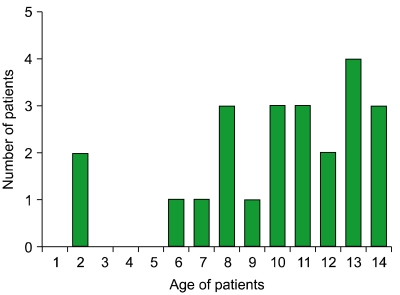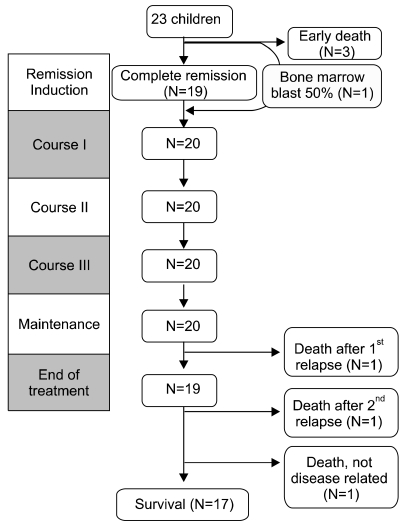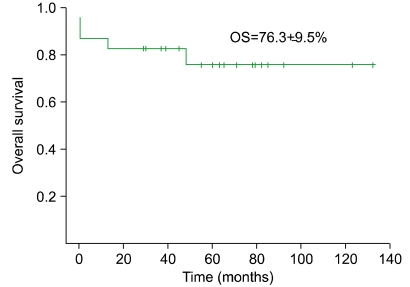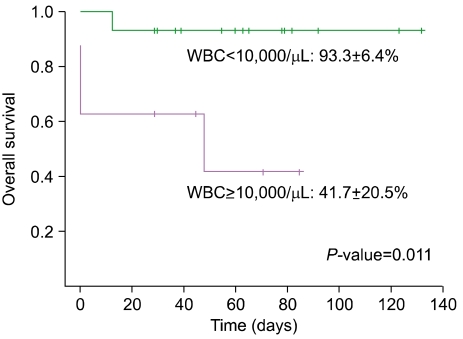Korean J Hematol.
2010 Dec;45(4):236-241. 10.5045/kjh.2010.45.4.236.
Outcome of childhood acute promyelocytic leukemia treated using a modified AIDA protocol
- Affiliations
-
- 1Department of Pediatrics, College of Medicine, The Catholic University of Korea, Seoul, Korea. dashwood@catholic.ac.kr
- KMID: 2252033
- DOI: http://doi.org/10.5045/kjh.2010.45.4.236
Abstract
- BACKGROUND
Combination treatment with all-trans-retinoic acid (ATRA) and anthracycline-based chemotherapy has led to major advances in the treatment of acute promyelocytic leukemia (APL).
METHODS
In this study, we reviewed the outcome of pediatric APL patients treated using a modified AIDA protocol at our institution.
RESULTS
Between May 1999 and December 2007, 23 patients were diagnosed with APL at the Department of Pediatrics, Saint Mary's Hospital, The Catholic University of Korea. Eleven patients were male (48%) (median age at diagnosis, 11 (range, 2-14) years). The treatment protocol consisted of remission induction (achieved by coadministration of ATRA and idarubicin), 3 courses of consolidation treatment, and 2 years of maintenance treatment during which ATRA was also administered. Three patients died early during remission induction due to CNS hemorrhage. The remaining 20 patients achieved complete remission (CR), with an overall CR rate of 87%. Two patients relapsed and died, and another patient died of pneumonia unrelated to APL. Four patients (17%) were diagnosed with ATRA syndrome, and all patients showed resolution of symptoms. The event-free survival (EFS) and overall survival (OS) of the cohort were 78.3+/-8.6% and 76.3+/-9.5%, respectively. Initial WBC count at diagnosis was the only significant prognostic factor for the rate of CR (P=0.039) and OS (P=0.039).
CONCLUSION
A modified AIDA protocol for the treatment of childhood APL leads to improved EFS and OS, with limited ATRA syndrome-associated toxicity. Active monitoring and treatment of patients with high initial WBC counts may help in reducing mortality.
MeSH Terms
Figure
Cited by 1 articles
-
Clinical Characteristics and Treatment Outcomes of Childhood Acute Promyelocytic Leukemia in Korea: A Nationwide Multicenter Retrospective Study by Korean Pediatric Oncology Study Group
Kyung Mi Park, Keon Hee Yoo, Seong Koo Kim, Jae Wook Lee, Nack-Gyun Chung, Hee Young Ju, Hong Hoe Koo, Chuhl Joo Lyu, Seung Min Han, Jung Woo Han, Jung Yoon Choi, Kyung Taek Hong, Hyoung Jin Kang, Hee Young Shin, Ho Joon Im, Kyung-Nam Koh, Hyery Kim, Hoon Kook, Hee Jo Baek, Bo Ram Kim, Eu Jeen Yang, Jae Young Lim, Eun Sil Park, Eun Jin Choi, Sang Kyu Park, Jae Min Lee, Ye Jee Shim, Ji Yoon Kim, Ji Kyoung Park, Seom Gim Kong, Young Bae Choi, Bin Cho, Young Tak Lim
Cancer Res Treat. 2022;54(1):269-276. doi: 10.4143/crt.2021.313.
Reference
-
1. Avvisati G, Lo Coco F, Diverio D, et al. AIDA (all-trans retinoic acid + idarubicin) in newly diagnosed acute promyelocytic leukemia: a Gruppo Italiano Malattie Ematologiche Maligne dell' Adulto (GIMEMA) pilot study. Blood. 1996; 88:1390–1398. PMID: 8695858.2. Melnick A, Licht JD. Deconstructing a disease: RARalpha, its fusion partners, and their roles in the pathogenesis of acute promyelocytic leukemia. Blood. 1999; 93:3167–3215. PMID: 10233871.3. Tallman MS, Hakimian D, Kwaan HC, Rickles FR. New insights into the pathogenesis of coagulation dysfunction in acute promyelocytic leukemia. Leuk Lymphoma. 1993; 11:27–36. PMID: 8220153.
Article4. Kim SG, Han CW, Kim YJ, et al. Effect of all-trans retinoic acid (ATRA) on the remission induction and coagulopathy in acute promelocytic leukemia (APL). Korean J Med. 1997; 53:199–206.5. Bapna A, Nair R, Tapan KS, et al. All-trans-retinoic acid (ATRA): pediatric acute promyelocytic leukemia. Pediatr Hematol Oncol. 1998; 15:243–248. PMID: 9615322.
Article6. Cho YY, Kim JG, Chae YS, Moon JH, Ahn BM, Sohn SK. Salvage treatments with all-trans retinoic acid and arsenic trioxide-based regimens in acute promyelocytic leukemia. Korean J Med. 2008; 74:596–604.7. Sanz MA, Martín G, Rayón C, et al. PETHEMA group. A modified AIDA protocol with anthracycline-based consolidation results in high antileukemic efficacy and reduced toxicity in newly diagnosed PML/RARalpha-positive acute promyelocytic leukemia. Blood. 1999; 94:3015–3021. PMID: 10556184.8. de Botton S, Coiteux V, Chevret S, et al. Outcome of childhood acute promyelocytic leukemia with all-trans-retinoic acid and chemotherapy. J Clin Oncol. 2004; 22:1404–1412. PMID: 15084614.
Article9. Tallman MS, Andersen JW, Schiffer CA, et al. All-trans-retinoic acid in acute promyelocytic leukemia. N Engl J Med. 1997; 337:1021–1028. PMID: 9321529.
Article10. Kim M, Lee SA, Park HI, et al. Two distinct clonal populations in acute promyelocytic leukemia, one involving chromosome 17 and the other involving an isochromosome 17. Cancer Genet Cytogenet. 2010; 197:185–188. PMID: 20193853.
Article11. Park JP, Fairweather RB, Mohandas TK. Isochromosome for derivative 17q in acute promyelocytic leukemia: evidence for two copies of PML-RARA and favorable response to all-trans-retinoic acid therapy. Genes Chromosomes Cancer. 1997; 18:151–153. PMID: 9115966.
Article12. Rubnitz JE. Childhood acute myeloid leukemia. Curr Treat Options Oncol. 2008; 9:95–105. PMID: 18506629.
Article13. Kaspers GJ, Zwaan CM. Pediatric acute myeloid leukemia: towards high-quality cure of all patients. Haematologica. 2007; 92:1519–1532. PMID: 18024401.
Article14. Stone RM, Mayer RJ. The unique aspects of acute promyelocytic leukemia. J Clin Oncol. 1990; 8:1913–1921. PMID: 2230879.
Article15. Testi AM, Biondi A, Lo Coco F, et al. GIMEMA-AIEOP AIDA protocol for the treatment of newly diagnosed acute promyelocytic leukemia (APL) in children. Blood. 2005; 106:447–453. PMID: 15677559.16. Ortega JJ, Madero L, Martín G, et al. Treatment with all-trans retinoic acid and anthracycline monochemotherapy for children with acute promyelocytic leukemia: a multicenter study by the PETHEMA Group. J Clin Oncol. 2005; 23:7632–7640. PMID: 16234524.17. Tallman MS, Nabhan C, Feusner JH, Rowe JM. Acute promyelocytic leukemia: evolving therapeutic strategies. Blood. 2002; 99:759–767. PMID: 11806975.
Article18. da Costa Moraes CA, Trompieri NM, Cavalcante Felix FH. Pediatric acute promyelocytic leukemia: all-transretinoic acid therapy in a Brazilian pediatric hospital. J Pediatr Hematol Oncol. 2008; 30:387–390. PMID: 18458575.
Article19. Manola KN, Karakosta M, Sambani C, et al. Isochromosome der(17)(q10)t(15;17) in acute promyelocytic leukemia resulting in an additional copy of the RARA-PML fusion gene: report of 4 cases and review of the literature. Acta Haematol. 2010; 123:162–170. PMID: 20224268.
Article20. Im SA, Kim SH, Lee MA, et al. Identification of ider[17q] in addition to t[15;17] in acute promyelocytic leukemia using whole chromosome painting probes made by interspecies hybrid using inter-Alu PCR. Cancer Genet Cytogenet. 2000; 118:169–170. PMID: 10798868.21. Frankel SR, Eardley A, Lauwers G, Weiss M, Warrell RP Jr. The "retinoic acid syndrome" in acute promyelocytic leukemia. Ann Intern Med. 1992; 117:292–296. PMID: 1637024.
Article22. de Botton S, Chevret S, Coiteux V, et al. Early onset of chemotherapy can reduce the incidence of ATRA syndrome in newly diagnosed acute promyelocytic leukemia (APL) with low white blood cell counts: results from APL 93 trial. Leukemia. 2003; 17:339–342. PMID: 12592333.
Article23. Patatanian E, Thompson DF. Retinoic acid syndrome: a review. J Clin Pharm Ther. 2008; 33:331–338. PMID: 18613850.
Article
- Full Text Links
- Actions
-
Cited
- CITED
-
- Close
- Share
- Similar articles
-
- Promyelocytic sarcoma of the sternum: a case report and review of the literature
- Overview of Acute Promyelocytic Leukemia
- A case of microgranular acute promyelocytic leukemia
- A case of microgranular acute promyelocytic leukemia with positive reaction of nonspecific esterase
- Transient spontaneous remission in acute promyelocytic leukemia: two case reports





